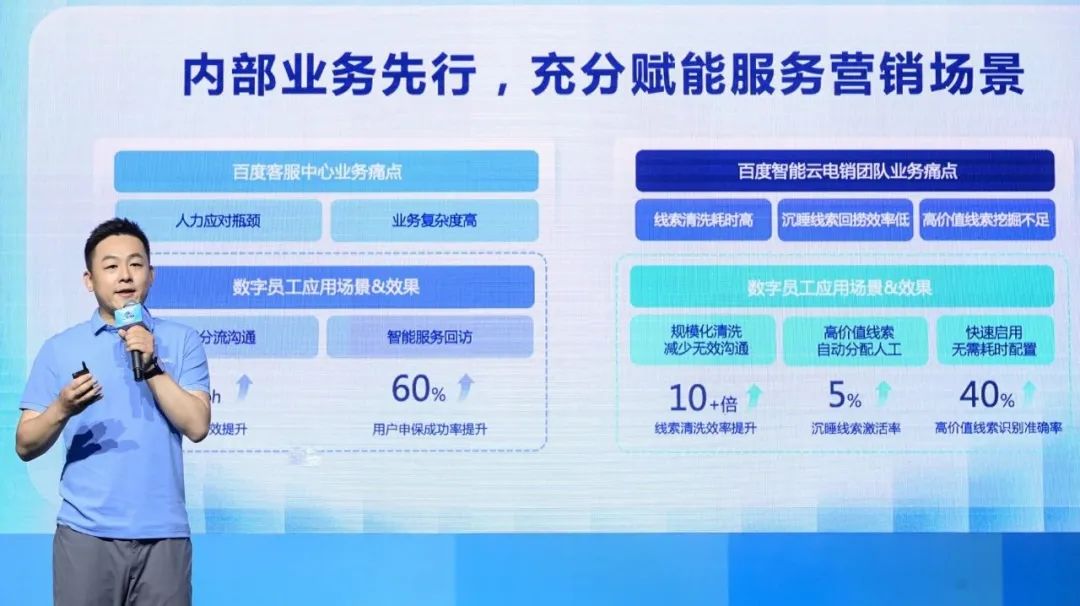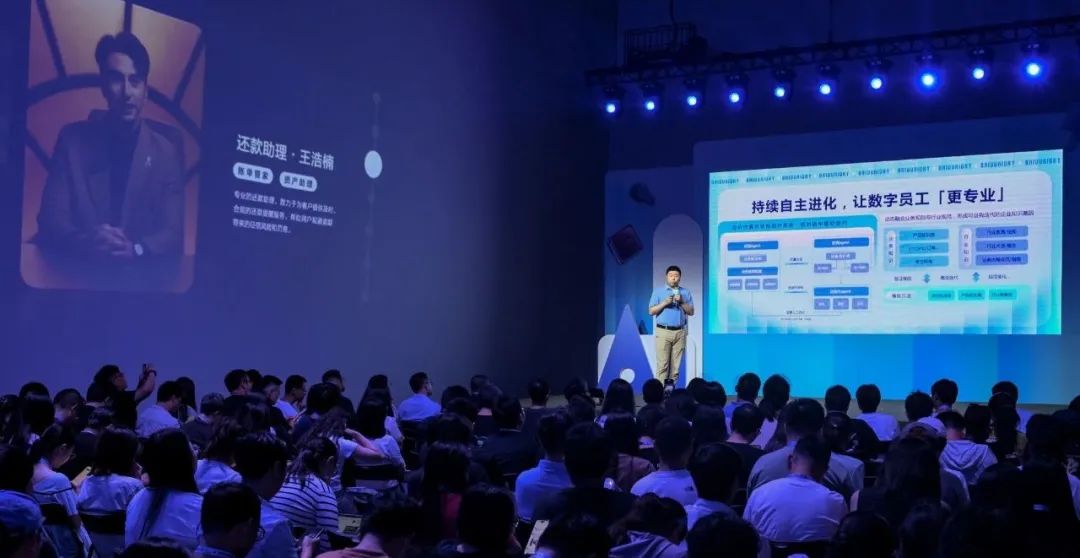Breaking News: Digital Humans Poised to Revolutionize Multiple Industries
![]() 08/14 2025
08/14 2025
![]() 593
593
Are my colleagues really human?
This question isn't plucked from a horror film but stems from the latest doubts swirling among contemporary professionals. Recently, numerous professionals in large corporations have noted the presence of enigmatic colleagues rumored to have unparalleled performance, leaving everyone wondering about the identities of these mysterious experts.

What's the catch? An event hosted by Baidu Intelligent Cloud might have provided the answer. On that day, Baidu Intelligent Cloud officially launched the world's first batch of AI digital employees, encompassing seven core business roles: marketing manager, repayment assistant, car salesperson, promotion specialist, product manager, course consultant, and recruitment specialist.
At this unveiling, Baidu not only offered attendees an interactive experience with these digital employees but also "issued work permits" to them, heralding the official "employment" of these seven digital workers. These digital humans have piqued the curiosity of professionals worldwide.
What does this signify? The journey of enterprise AI digitization has comprehensively progressed from mimicking human characteristics to focusing on job responsibilities. The three employment criteria for digital employees—understanding business, delivering results, and evolving—mirror the requirements for human employees.
As the capabilities of large models iterate and evolve at an unprecedented pace, commercial reforms are closely following suit. Baidu Intelligent Cloud's launch of the world's first batch of AI digital employees marks another milestone in the industry's AI implementation: the era of AI Agents has dawned, making it a realistic scenario for intelligent entities to work alongside humans in the form of "digital employees."
From One to Seven
Your Digital Human Colleagues Are Being Hired
At the event, a digital human experience zone was set up, showcasing a car marketing manager digital employee that can mimic human speech, make calls to customers, and screen out high-intent customers based on the communication results, which are then followed up by real humans.
The performance of the education and training course consultants was equally impressive. They not only provide consulting services across multiple links such as enrollment, service, and renewal but also screen and filter customer groups through algorithms. They can even leverage historical conversation records to output corresponding renewal plans.
Such outstanding demonstrations inevitably evoke memories of Luo Yonghao's digital human livestreaming that garnered overnight fame. Luo's digital doppelgänger completed the first livestream with his signature humorous tone and realistic appearance, attracting over 13 million viewers in over six hours and generating a GMV exceeding 55 million yuan, setting a new record for digital human livestreaming at the time.
Clearly, the successive emergence of cases where digital humans empower businesses isn't accidental; the trend has arrived. McKinsey's research reveals that while only 15% of enterprises deployed Agents in 2024, this proportion has surged to over 60% in 2025. More than 70% of CEOs believe that Agents will significantly transform enterprise business models within three years.
It's an undeniable fact that the digital human market stands on the brink of explosion.
As early as the Baidu Create 2025 conference, Robin Li predicted that "one of the most exciting breakthrough applications in 2025 will be digital humans." But who will spearhead this trend? Securing this role demands immense effort.
Currently, in the production of digital humans, there's a relentless pursuit of reducing the materials needed for their generation. While the evolution of appearance and limbs is swift, manufacturers' breakthroughs in business accumulation and trust-building are less profound. This results in a concern that customers find particularly sensitive: spending a high cost on a nearly commercially ineffective digital human that exists only in theory, with the manufacturer lacking operational capabilities. Such collaborations put both parties in a dilemma.
During the event's sharing, Shi Zheng, General Manager of Baidu Intelligent Cloud's Intelligent Marketing Products, admitted that what enterprises truly need now are Agents that can meet KPIs and be accountable for business results. Only by achieving a qualitative leap from functional execution to business decision-making and outcome delivery can digital humans truly take root in enterprises.

From Resembling Humans to Being Humans
How Should the Journey Proceed?
In fact, Baidu's exploration of digital human applications has yielded distinct and remarkable outcomes. Shi Zheng, General Manager of Baidu Intelligent Cloud's Intelligent Marketing Products, summarized three key points: business scenario implementation, industry data accumulation, and expansion of interactive interfaces.
Regarding business scenario implementation, digital human products must not merely deliver tools to customers but must bridge the gap to the customer's final usage effect. To achieve this, manufacturers must conduct extensive standardized operating procedure training for different industries and scenarios, attaining the level of business expertise at the core.
In terms of industry data accumulation, manufacturers must possess their own data pools, and establishing data pools with the ability to collect and organize data is no small feat. Taking Baidu digital humans as an example, it leverages its extensive product line and seamless feedback channels to accumulate vast amounts of feedback data from users and clients. The large model, fed based on extensive and real data, equips digital humans with superior business planning and decision-making capabilities. Behind Baidu digital humans' robust corpus lies over 20 years of expansion and commitment in the information ecosystem.
Concerning the expansion of interactive interfaces, a simple two-dimensional image of a digital human is insufficient to support enterprise interaction needs. More advanced expansions are essential in multiple dimensions, including appearance, limbs, and movements. Even abilities required by real human employees, such as making phone calls, handling business work orders, and transaction capabilities like booking tickets, are abilities that digital employees must possess.
The capability building of digital employees is a complex project that necessitates manufacturers to possess profound internal AI capabilities.
Large companies like Baidu naturally enjoy a significant competitive edge, but this doesn't mean that other smaller companies lack opportunities.
Amidst the rapidly iterating and updating needs of enterprise digitization, many requirements, while non-standardized, remain vital to customers. Therefore, how startup teams form a business closed loop based on non-standardized products, leverage their technological characteristics to create a differentiated competitive landscape in the field of digital humans, and embed themselves within the abundant product ecosystems of large companies is crucial for the survival of small companies.

The Employment of Seven Digital Employees Reveals the Ambition to Revolutionize Multiple Industries
In fact, the employment of Baidu Intelligent Cloud's seven digital employees this time has unveiled the trend across the entire industry. As Shi Zheng noted, Agents are currently widely used in various domestic industries, but the most effective implementations are still in sub-functional areas occupied by intelligent entities.
In the recruitment industry, digital humans can keenly perceive interviewees' intentions, adjust communication strategies in real-time, and increase interview participation rates by 40%. In the education and training industry, digital humans collaborate with real human education consultants to achieve high-value conversions and enhance employee efficiency by 40%. In the automotive industry, digital employees oversee the entire process, actively recommend car models, match customer needs based on the core highlights of cars, complete test drive appointments, and even have a thorough understanding of preferential policies.
The most compelling example is the performance of Baidu Intelligent Cloud's digital employee customer service center. Data shows that digital employees efficiently handle customer inquiries 24/7, increasing user application success rates by 60% and service timeliness by 18 hours.
Clearly, digital humans revolutionizing industries has become a hot topic in the current AI technology field, and behind this trend lies the enormous market potential.
According to the latest "2025 Global Digital Human Market Report," the digital human market size is projected to grow from $34.88 billion in 2024 to $51.94 billion in 2025, with an average annual growth rate of 48.9%.
By 2029, the market size is expected to reach $252.61 billion, showcasing immense development potential. Digital humans will demonstrate significant application value across various industries such as e-commerce, entertainment, social networking, and customer service.
This explains why Baidu Intelligent Cloud is advancing digital human products at such a rapid pace.
From one "Luo Yonghao" to seven "new employees," Baidu Intelligent Cloud took less than two months. From seven industries to various industries, Baidu Intelligent Cloud will require even less time.
According to Baidu Intelligent Cloud's promotional strategy, it is continuously creating digital employees for more positions to deeply empower enterprise marketing, customer acquisition, and customer service. This year, Baidu Intelligent Cloud will focus on expanding digital employee scenarios in the education, automotive, finance, and fast-moving consumer goods industries, collaborating with leading clients to create typical models for numerous industries, with the enterprise usage threshold as low as ten thousand yuan.
Ten thousand yuan? For AI digital employees with full-stack capabilities, this is indeed a game-changer. Baidu is clearly poised to shake up the already fiercely competitive digital human industry. Under competitive pressure, ten thousand yuan digital humans are highly attractive to customers. Once leading manufacturers leverage their scale, technology, and other advantages to venture into the industry's low-price zone, while digital humans revolutionize other industries, they themselves will also face a significant shakeout and clearance.
Therefore, whether the repeated promotion of low prices by large companies will lead to cut-throat competition and harm the healthy development of the industry remains to be seen.
Regardless, the era of large-scale digital human implementation in commercial scenarios has arrived. For the players involved, whether the road ahead is filled with surprises or shocks remains to be explored and pursued through their own efforts.







